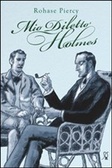

His intellectual interest in crime seems to undermine his sense of right and duty-although when push comes to shove, Holmes has a relatively evolved sense of morality. He has more than a vested interest in crime occurring, and he often laments the lack of interesting crimes. It is hinted that it is only accidental that he is working on this side of the law: Holmes could easily turn his great mind to crime. He has a ready insult for everyone whose intelligence is less than his: which, according to him, is everyone. He has an extensive knowledge of the minutiae relevant to his work, but he ignores most other branches of knowledge. He has intentionally closed himself off from feelings in order to make himself a more effective detective.

Sherlock Holmes is incredibly intelligent, arrogant, emotionally distant. Like so many great relationships, that between the Master and his loyal archivist is a study in opposites. But here I go, plunging bravely into the Canon. There's so much incredible fan-created work for this pairing, not to mention the fairly academic study of Holmes's sexuality, Watson's wives, and other issues related to the pairing, that I'm a little bit cowed. I'm incredibly honored to be writing this essay, and I'm not sure I can actually do it justice. Spoilers: The whole entire bookverse, especially Study in Scarlet, Sign of Four, "The Final Problem," and "The Adventure of the Empty House," A Century's Worth of Subtext: Holmes/Watsonįandom: Sherlock Holmes by Sir Arthur Conan Doyle


 0 kommentar(er)
0 kommentar(er)
